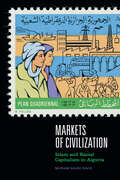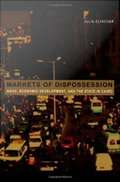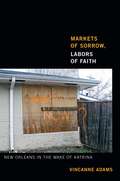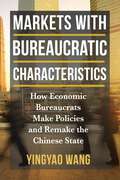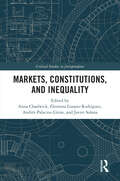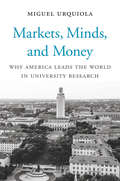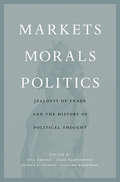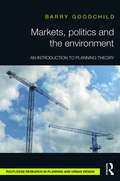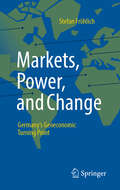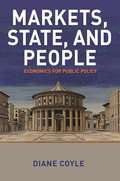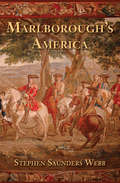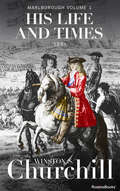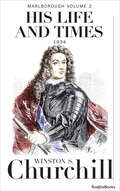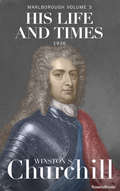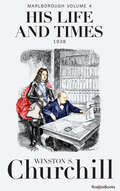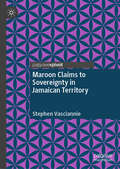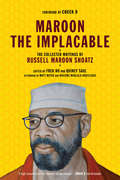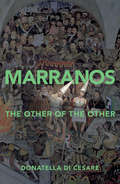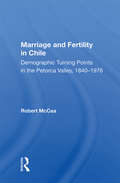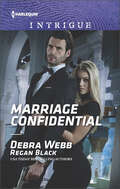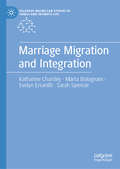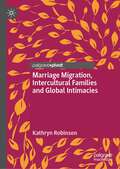- Table View
- List View
Markets of Civilization: Islam and Racial Capitalism in Algeria (Theory in Forms)
by Muriam Haleh DavisIn Markets of Civilization Muriam Haleh Davis provides a history of racial capitalism, showing how Islam became a racial category that shaped economic development in colonial and postcolonial Algeria. French officials in Paris and Algiers introduced what Davis terms “a racial regime of religion” that subjected Algerian Muslims to discriminatory political and economic structures. These experts believed that introducing a market economy would modernize society and discourage anticolonial nationalism. Planners, politicians, and economists implemented reforms that both sought to transform Algerians into modern economic subjects and drew on racial assumptions despite the formally color-blind policies of the French state. Following independence, convictions about the inherent link between religious beliefs and economic behavior continued to influence development policies. Algerian president Ahmed Ben Bella embraced a specifically Algerian socialism founded on Islamic principles, while French technocrats saw Algeria as a testing ground for development projects elsewhere in the Global South. Highlighting the entanglements of race and religion, Davis demonstrates that economic orthodoxies helped fashion understandings of national identity on both sides of the Mediterranean during decolonization.
Markets of Dispossession: Ngos, Economic Development, and the State in Cairo
by Julia ElyacharWhat happens when the market tries to help the poor? In many parts of the world today, neoliberal development programs are offering ordinary people the tools of free enterprise as the means to well-being and empowerment. Schemes to transform the poor into small-scale entrepreneurs promise them the benefits of the market and access to the rewards of globalization. Markets of Dispossession is a theoretically sophisticated and sobering account of the consequences of these initiatives. Julia Elyachar studied the efforts of bankers, social scientists, ngo members, development workers, and state officials to turn the craftsmen and unemployed youth of Cairo into the vanguard of a new market society based on microenterprise. She considers these efforts in relation to the alternative notions of economic success held by craftsmen in Cairo, in which short-term financial profit is not always highly valued. Through her careful ethnography of workshop life, Elyachar explains how the traditional market practices of craftsmen are among the most vibrant modes of market life in Egypt. Long condemned as backward, these existing market practices have been seized on by social scientists and development institutions as the raw materials for experiments in "free market" expansion. Elyachar argues that the new economic value accorded to the cultural resources and social networks of the poor has fueled a broader process leading to their economic, social, and cultural dispossession.
Markets of Sorrow, Labors of Faith: New Orleans in the Wake of Katrina
by Vincanne AdamsMarkets of Sorrow, Labors of Faith is an ethnographic account of long-term recovery in post-Katrina New Orleans. It is also a sobering exploration of the privatization of vital social services under market-driven governance. In the wake of Hurricane Katrina, public agencies subcontracted disaster relief to private companies that turned the humanitarian work of recovery into lucrative business. These enterprises profited from the very suffering that they failed to ameliorate, producing a second-order disaster that exacerbated inequalities based on race and class and leaving residents to rebuild almost entirely on their own. Filled with the often desperate voices of residents who returned to New Orleans, Markets of Sorrow, Labors of Faith describes the human toll of disaster capitalism and the affect economy it has produced. While for-profit companies delayed delivery of federal resources to returning residents, faith-based and nonprofit groups stepped in to rebuild, compelled by the moral pull of charity and the emotional rewards of volunteer labor. Adams traces the success of charity efforts, even while noting an irony of neoliberalism, which encourages the very same for-profit companies to exploit these charities as another market opportunity. In so doing, the companies profit not once but twice on disaster.
Markets with Bureaucratic Characteristics: How Economic Bureaucrats Make Policies and Remake the Chinese State (The Middle Range Series)
by Yingyao WangChina’s breathtaking economic development has been driven by bureaucrats. Even as the country transitioned away from socialist planning toward a market economy, the economic bureaucracy retained a striking degree of influence and control over crafting and implementing policy. Yet bureaucrats are often dismissed as faceless and inconsequential, their role neglected in favor of party leaders’ top-down rule or bottom-up initiatives.Markets with Bureaucratic Characteristics offers a new account of economic policy making in China over the past four decades that reveals how bureaucrats have spurred large-scale transformations from within. Yingyao Wang demonstrates how competition among bureaucrats motivated by careerism has led to the emergence of new policy approaches. Second-tier economic bureaucrats instituted distinctive—and often conflicting—“policy paradigms” aimed at securing their standing and rewriting China’s long-term development plans for their own benefit. Emerging from the middle levels of the bureaucracy, these policy paradigms ultimately reorganized the Chinese economy and reshaped state-market relations. Drawing on fine-grained biographical and interview data, Wang traces how officials coalesced around shared career trajectories, generational experiences, and social networks to create new alliances and rivalries. Shedding new light on the making and trajectory of China’s ambitious economic reforms, this book also provides keen sociological insight into the relations among bureaucracy, states, and markets.
Markets, Capitalism and Urban Space in India: Right to Sell (Routledge Research on Urban Asia)
by Anirban AcharyaThis book analyses the question of the right to the city, informal economies and the non-western shape of neoliberal governance in India through a new analytic: the right to sell. The book examines why and how states attempt to curb, control, and eliminate markets of urban informal street vendors. Focusing on Kolkata, the author provides a theoretical explanation of this puzzle by distilling and analysing the inherent tensions among the constitutive elements of neoliberal governance, namely, growth imperative, market activism, and corporatization, and demonstrates its implications for the formal/informal boundaries of the economy. A useful addition to the existing literatures on the right to the city, informal economies, and the shapes that neoliberalism takes in the non-west, the book provides a non-western counter to accounts of neoliberalism and will be of interest to academics working in the fields of South Asian Studies, Urban Studies, and Political Economy.
Markets, Constitutions, and Inequality (Critical Studies in Jurisprudence)
by Anna Chadwick, Eleonora Lozano-Rodríguez, Andrés Palacios-Lleras, and Javier SolanaThis interdisciplinary collection examines the significance of constitutions in setting the terms and conditions upon which market economies operate. With some important exceptions, most notably from the tradition of Latin American constitutionalism, scholarship on constitutional law has paid negligible attention to questions of how constitutions relate to economic phenomena. A considerable body of literature has debated the due limits of the exercise of executive and legislative power, and discussions about legitimacy, democracy, and the adjudication of rights (civil and political, and socioeconomic) abound, yet scant attention has been paid by constitutional lawyers to the ways in which constitutions may protect and empower economic actors, and to how constitutions might influence the regulation and governance of specific markets. The contributors to this collection mobilize insights from other disciplines – including economic theory, history, and sociology – and consider the relationship between constitutional frameworks and bodies of law – including property law, criminal law, tax law, financial regulation, and human rights law – to advance understanding of how constitutions relate to markets and to the political economy. This book’s analysis of the role constitutions play in shaping markets will appeal to scholars and students in law, economics, history, politics, and sociology.
Markets, Minds, and Money: Why America Leads the World in University Research
by Miguel UrquiolaA colorful history of US research universities, and a market-based theory of their global success. American education has its share of problems, but it excels in at least one area: university-based research. That’s why American universities have produced more Nobel Prize winners than those of the next twenty-nine countries combined. Economist Miguel Urquiola argues that the principal source of this triumph is a free-market approach to higher education. Until the late nineteenth century, research at American universities was largely an afterthought, suffering for the same reason that it now prospers: the free market permits institutional self-rule. Most universities exploited that flexibility to provide what well-heeled families and church benefactors wanted. They taught denominationally appropriate materials and produced the next generation of regional elites, no matter the students’—or their instructors’—competence. These schools were nothing like the German universities that led the world in research and advanced training. The American system only began to shift when certain universities, free to change their business model, realized there was demand in the industrial economy for students who were taught by experts and sorted by talent rather than breeding. Cornell and Johns Hopkins led the way, followed by Harvard, Columbia, and a few dozen others that remain centers of research. By the 1920s the United States was well on its way to producing the best university research. Free markets are not the solution for all educational problems. Urquiola explains why they are less successful at the primary and secondary level, areas in which the United States often lags. But the entrepreneurial spirit has certainly been the key to American leadership in the research sector that is so crucial to economic success.
Markets, Morals, Politics: Jealousy of Trade and the History of Political Thought
by Béla KapossyWhen István Hont died in 2013, the world lost a giant of intellectual history. A leader of the Cambridge School of Political Thought, Hont argued passionately for a global-historical approach to political ideas. To better understand the development of liberalism, he looked not only to the works of great thinkers but also to their reception and use amid revolution and interstate competition. His innovative program of study culminated in the landmark 2005 book Jealousy of Trade, which explores the birth of economic nationalism and other social effects of expanding eighteenth-century markets. Markets, Morals, Politics brings together a celebrated cast of Hont’s contemporaries to assess his influence, ideas, and methods. Richard Tuck, John Pocock, John Dunn, Raymond Geuss, Gareth Stedman Jones, Michael Sonenscher, John Robertson, Keith Tribe, Pasquale Pasquino, and Peter N. Miller contribute original essays on themes Hont treated with penetrating insight: the politics of commerce, debt, and luxury; the morality of markets; and economic limits on state power. The authors delve into questions about the relationship between states and markets, politics and economics, through examinations of key Enlightenment and pre-Enlightenment figures in context—Hobbes, Rousseau, Spinoza, and many others. The contributors also add depth to Hont’s lifelong, if sometimes veiled, engagement with Marx. The result is a work of interpretation that does justice to Hont’s influence while developing its own provocative and illuminating arguments. Markets, Morals, Politics will be a valuable companion to readers of Hont and anyone concerned with political economy and the history of ideas.
Markets, Politics and the Environment: An Introduction to Planning Theory
by Barry GoodchildMarkets, Politics and the Environment answers three groups of question: What is planning?’ and as part of this ‘What are its key features as a style of social practice and action?’ and ‘How does planning as a style of social practice relate to social and economic change? How, as part of the justification for planning, might claims of valid technical knowledge be constructed? What is meant by ‘rational’? What is the contribution of pragmatism as a supplement or replacement to rationalism? How might rationality and pragmatism be adapted to postmodernism and the requirements of diversity? Finally, how may concepts of planning be reoriented towards sustainable development as a collective duty? How might sustainable development be reworked in relation to planning as a means of managing and stimulating change? Each group of question is discussed in a separate chapter and is associated with different theories, debates and examples of practice. Markets, Politics and the Environment concludes that the full implications of sustainable development and climate change point in the direction of a different type of state- a green state whose future functioning can draw on planning theory but at present can only be conceived as a sketchy outline.
Markets, Power, and Change: Germany's Geoeconomic Turning Point
by Stefan FröhlichWhile the issue of Ukraine is engaging the public and fostering a greater interest in foreign and security policy topics, global economic policy issues and debates largely pass most people by and are primarily discussed by economists and economic historians. Unlike during the Euro crisis, whose complexities overwhelmed society as a whole, questions about supply chains, resource security, and technological change have now reached the press and media. However, for most people, the necessity of a related paradigm shift in German foreign and economic policy is not evident. This is particularly true for the increasing importance of using economic means to enforce (power) political interests – in other words, the new "geoeconomics". This book situates the scientific findings and debates surrounding this term within the global confrontation between the USA, China, and Europe, translating them into language that everyone can understand. The author contributes to the public debate in Germany with this essay and therefore addresses the interested public.
Markets, State, and People: Economics for Public Policy
by Diane CoyleA textbook that examines how societies reach decisions about the use and allocation of economic resourcesWhile economic research emphasizes the importance of governmental institutions for growth and progress, conventional public policy textbooks tend to focus on macroeconomic policies and on tax-and-spend decisions. Markets, State, and People stresses the basics of welfare economics and the interplay between individual and collective choices. It fills a gap by showing how economic theory relates to current policy questions, with a look at incentives, institutions, and efficiency. How should resources in society be allocated for the most economically efficient outcomes, and how does this sit with society’s sense of fairness?Diane Coyle illustrates the ways economic ideas are the product of their historical context, and how events in turn shape economic thought. She includes many real-world examples of policies, both good and bad. Readers will learn that there are no panaceas for policy problems, but there is a practical set of theories and empirical findings that can help policymakers navigate dilemmas and trade-offs. The decisions faced by officials or politicians are never easy, but economic insights can clarify the choices to be made and the evidence that informs those choices. Coyle covers issues such as digital markets and competition policy, environmental policy, regulatory assessments, public-private partnerships, nudge policies, universal basic income, and much more.Markets, State, and People offers a new way of approaching public economics.A focus on markets and institutionsPolicy ideas in historical contextReal-world examplesHow economic theory helps policymakers tackle dilemmas and choices
Mark Zuckerberg: From Facebook to Famous (Extraordinary Success with a High School)
by Z. B. HillIn the last few decades, more and more people are going to college to further their education. It's hard to become a scientist, a professor, or a businessperson without getting some sort of college degree--but college isn't always necessary to achieve success. Some people are ready to enter the workforce right after high school. Mark Zuckerberg was one of those people. Although the Facebook founder went to Harvard, he dropped out to chase his dreams of changing the way people interact on the Internet. Today, Mark's company is one of the most successful of the Internet age, worth billions of dollars. Mark Zuckerberg changed the way we communicate forever. And what's most amazing about his story is that the Internet pioneer has done it all without a college degree!
Marlborough's America
by Stephen Saunders WebbScholars of British America generally conclude that the early eighteenth-century Anglo-American empire was commercial in economics, liberal in politics, and parochial in policy, somnambulant in an era of “salutary neglect,” but Stephen Saunders Webb here demonstrates that the American provinces, under the spur of war, became capitalist, coercive, and aggressive, owing to the vigorous leadership of career army officers, trained and nominated to American government by the captain general of the allied armies, the first duke of Marlborough, and that his influence, and that of his legates, prevailed through the entire century in America. Webb’s work follows the duke, whom an eloquent enemy described as “the greatest statesman and the greatest general that this country or any other country has produced,” his staff and soldiers, through the ten campaigns, which, by defanging France, made the union with Scotland possible and made “Great Britain” preeminent in the Atlantic world. Then Webb demonstrates that the duke’s legates transformed American colonies into provinces of empire. Marlborough’s America, fifty years in the making, is the fourth volume ofThe Governors-General.
Marlborough: His Life and Times (Marlborough: His Life and Times #1)
by Winston S. ChurchillThe prime minister and Nobel Prize–winning historian begins his four-volume biography of the British statesman John Churchill, first Duke of Marlborough. In the first volume of this ambitious and stunningly written biography, Sir Winston S. Churchill discusses the early career and stratospheric rise of his illustrious, seventeenth century ancestor. John Churchill, the Duke of Marlborough, may have been eclipsed in history by his more well-known descendant, but in his time, Marlborough was considered one of England&’s foremost military and political leaders. This first installment pays particular attention to personal details of Marlborough&’s life, and the important role several women played in his success—including his sister, his wife, the Duchess of Cleveland, and Queen Anne herself. Churchill breathes life into these personal connections in order to showcase Marlborough not only as a luminary figure in British history, but also to bring him to life once again in the mind of the reader. &“A sustained meditation on statecraft and war by the greatest war leader of our time.&” —Foreign Affairs &“The greatest historical work written in our century, an inexhaustible mine of political wisdom and understanding, which should be required reading for every student of political science.&” —Leo Strauss
Marlborough: His Life and Times (Marlborough: His Life and Times #2)
by Winston S. ChurchillThe second volume in the Nobel Prize winner&’s biography of John Churchill, first Duke of Marlborough: &“The greatest historical work written in our century&” (Leo Strauss). After the defeat of the Conservative government in the 1929 general election, Winston S. Churchill entered a period of political exile; a time he referred to as &“the wilderness years.&” It was during this time that Churchill began his work on Marlborough: His Life and Times, widely considered to be one of his most ambitious and masterful literary works. Although not as well remembered as his more famous descendant—Churchill himself—Marlborough was an influential soldier and statesman of seventeenth- and eighteenth-century Great Britain, known in his day as a gifted military commander who never lost a battle. This second volume of Churchill&’s four-part biography brings Marlborough&’s military successes, political intrigues, and personal passions to life, while his descendant reflects &“on the perplexities of alliances, the paradoxes of strategy, and the stresses of combat&” (Foreign Affairs). &“An inexhaustible mine of political wisdom and understanding, which should be required reading for every student of political science.&” —Leo Strauss
Marlborough: His Life and Times (Marlborough: His Life and Times #3)
by Winston S. ChurchillThe third volume of the Nobel Prize winner&’s hailed biography of John Churchill covers his military leadership in the seventeenth and eighteenth centuries. John Churchill, first Duke of Marlborough, was an accomplished military leader who never lost a battle. This is the third volume in Winston S. Churchill&’s sweeping, four-part biography of his illustrious ancestor, in which he recounts Marlborough&’s military successes in thrilling detail—including his support of William of Orange in the Glorious Revolution, his crucial role in the suppression of the Duke of Monmouth&’s rebellion, and his success in negotiating England&’s diplomatic position in the War of the Spanish Succession. With characteristic flair, Winston S. Churchill brings his ancestor&’s campaigns, intrigues, and personal relationships to life—and restores him to a prominent place in English history. &“A sustained meditation on statecraft and war by the greatest war leader of our time.&” —Foreign Affairs &“The greatest historical work written in our century, an inexhaustible mine of political wisdom and understanding, which should be required reading for every student of political science.&” —Leo Strauss
Marlborough: His Life and Times (Marlborough: His Life and Times #4)
by Winston S. ChurchillThe moving conclusion to the acclaimed multivolume biography of one of Britain&’s greatest military leaders by his Nobel Prize–winning descendant. The final installment in Winston S. Churchill&’s four-volume biography of John Churchill, the Duke of Marlborough—a famed military leader known for never having lost a military campaign. Despite his successes, Marlborough&’s later years were full of struggle—including attacks from political and personal enemies. Winston S. Churchill vividly recounts the intrigues and challenges of his ancestor&’s extraordinarily eventful life. In this last volume, detailing the end of his career, Marlborough&’s story is told with sensitivity and nuance—giving the reader an intimate glimpse into his state of mind. It&’s a fascinating read for anyone interested in English history—and provides profound insights into leadership, loyalty, and personal conduct as valuable today as three centuries ago. &“A sustained meditation on statecraft and war by the greatest war leader of our time.&” —Foreign Affairs &“The greatest historical work written in our century, an inexhaustible mine of political wisdom and understanding, which should be required reading for every student of political science.&” —Leo Strauss
Maroon Claims to Sovereignty in Jamaican Territory
by Stephen VasciannieThis book is concerned with the Maroons of Accompong Town in Jamaica. Especially within the last five years, these Maroons, who constitute in some measure a distinct cultural group living in the defined area of Accompong Town, have presented reinvigorated claims that they comprise, in law and in fact, an independent state within Jamaica. Under the guidance of their energetic leader, Chief Richard Currie, they have claimed all the rights and duties of a sovereign state, maintaining that they are fully entitled to enjoy these rights under the name “The Sovereign State of Accompong.” Against this background, there is scope for a review of the bases, in national and international law, of the core Maroon claim to statehood, and for the responses that may validly be offered to that claim. This publication addresses the relevant arguments, reviews the historical position of Maroons in Jamaican society and offers conclusions about the status of the Maroon claim. Most existing literature on the Maroons concentrates on Maroon status in history. This book adds to the literature by exploring the legal arguments about Maroon sovereignty in Accompong in national and international law, a topic that is yet to be fully canvassed.
Maroon the Implacable: The Collected Writings of Russell Maroon Shoatz
by Chuck D Matt Meyer Russell Maroon Shoatz Nozizwe Madlala-RoutledgeDuring a lengthy incarceration spent mostly in solitary confinement, Russell Maroon Shoatz has developed into a prolific writer and powerful voice for the disenfranchised. This first published collection of his accumulated works showcases his sharp and profound understanding of the current historical moment, with clear proposals for how to move forward embracing new political concepts and practices. Informed by Shoatz's experience as a leader in the Black Liberation Movement in Philadelphia, the pieces in this book put forth his fresh and self-critical retelling of the black liberation struggle in the United States and provide cutting-edge analysis of the prison-industrial complex. Innovative and revolutionary on multiple levels, the essays also discuss such varied topics as eco-socialism, matriarchy and eco-feminism, food security, prefiguration and the Occupy Wall Street movement. Including new essays written expressly for this volume, Shoatz's unique perspective offers many practical and theoretical insights for today's movements for social change.
Marranos: The Other of the Other
by Donatella Di CesareMarranos were Spanish or Portuguese Jews who converted to Christianity at the time of the Spanish Inquisition to avoid being massacred or forced to flee but who continued to practise Judaism in secret. They were persecuted by the first racist blood laws but the water of forced baptism was not enough to make them assimilate. Donatella Di Cesare sees the marranos as the quintessential figures of the modern condition: the marranos were not just those whom modernity cast out as the ‘other’, but were those ‘others’ who were forced to disavow their beliefs and conceal themselves. They became ‘the other of the other’, doubly excluded, condemned to a life of existential duplicity with no way out, spurned by both Catholics and Jews and unable to belong fully to either community. But this double life of the marranos turned out to be a secret source of strength. Doubly estranged, with no possibility of redemption, the marranos became modernity’s first true radicals. Dissidents out of necessity, they inaugurated modernity with their ambivalence and their split self. And their story is not over. By treating the history of the marranos as a prism through which to grasp the defining features of modernity, this highly original book will be of interest to a wide readership.
Marriage And Fertility In Chile: Demographic Turning Points In The Petorca Valley, 1840-1976
by Robert MccaaRecent population increases in Latin America have forced population experts to search for historical precedents and to examine the latest demographic data in an attempt to forecast the likely course of future trends. This book is the first demographic study of a Latin American community based on the family genealogy method developed by French histo
Marriage Confidential
by Debra Webb Regan BlackA sexy hero vows to love, honor…and stop the hacker!Marriage to Madison Goode—his secret high-school crush—is news to billionaire techno whiz Sam Bellemere! The gorgeous State Department liaison has summoned him to fix a cybersecurity breach at an art museum reception. But why is he guest-listed as her husband?Madison has her reasons…as does a nefarious hacker now threatening her life and career. But once they’ve gone public, introvert Sam and career-focused Madison must play their roles perfectly, trusting and protecting each other as they race to thwart disaster. Surprisingly, being close is easy. A real relationship might be possible…if a worldwide cyber attack doesn’t cost them their lives!
Marriage Equality: From Outlaws to In-Laws (Yale Law Library Series in Legal History and Reference)
by William N. Eskridge Jr. Christopher R. RianoThe definitive history of the marriage equality debate in the United States, praised by Library Journal as "beautifully and accessibly written. . . . An essential work.&” As a legal scholar who first argued in the early 1990s for a right to gay marriage, William N. Eskridge Jr. has been on the front lines of the debate over same‑sex marriage for decades. In this book, Eskridge and his coauthor, Christopher R. Riano, offer a panoramic and definitive history of America&’s marriage equality debate. The authors explore the deeply religious, rabidly political, frequently administrative, and pervasively constitutional features of the debate and consider all angles of its dramatic history. While giving a full account of the legal and political issues, the authors never lose sight of the personal stories of the people involved, or of the central place the right to marry holds in a person&’s ability to enjoy the dignity of full citizenship. This is not a triumphalist or one‑sided book but a thoughtful history of how the nation wrestled with an important question of moral and legal equality.
Marriage Migration and Integration: British South Asian Transnational Marriages And Processes Of Integration (Palgrave Macmillan Studies in Family and Intimate Life)
by Marta Bolognani Sarah Spencer Katharine Charsley Evelyn ErsanilliThis book provides the first sustained empirical evidence on the relationships between marriage migration and processes of integration, focusing on two of the largest British ethnic minority groups involved in these kinds of transnational marriages – Pakistani Muslims and Indian Sikhs. In Britain, and across Europe, concern has been increasingly expressed over the implications of marriage-related migration for integration. Children and grandchildren of former immigrants marrying partners from their ancestral ‘homelands’ is often presented as problematic in forming a 'first generation in every generation,’ and inhibiting processes of individual and group integration, impeding socio-economic participation and cultural change. As a result, immigration restrictions have been justified on the grounds of promoting integration, despite limited evidence. Marriage Migration and Integration provides much needed new grounding for both academic and policy debates. This book draws on both quantitative and qualitative data to compare transnational ‘homeland’ marriages with intra-ethnic marriages within the UK. Using a distinctive holistic model of integration, the authors examine processes in multiple interacting domains, such as employment, education, social networks, extended family living, gender relations and belonging. It will be of use to students and scholars across sociology, social anthropology, and social policy with a focus on migration, integration, family studies, gender, and ethnic studies, as well as policy-makers and service providers in the UK and across Europe.
Marriage Migration, Intercultural Families and Global Intimacies
by Kathryn RobinsonThis book brings an innovative study of marriage migration in Australia, offering new insights into issues of intimacy and authenticity online. In doing so, it delivers on five main objectives: exploring emotional attachment and personal life in global spaces; interrogating stereotypes and their pervasive influence on personal relations; analysing attitudes and social practice within the institution of marriage; investigating immigration policy, marriage, and citizens’ rights; theorizing gender and class relations in the current global order. The analysis moves between ‘online’ and ‘offline’ social relations and processes, with comparative data enabling a critical framing of the data on marriage relationships developed online. This important contribution places contemporary forms of transcultural marriage and marriage brokering in a historical context of ‘marriage’ in the ‘Anglosphere’ tradition, and in particular historical forms of marriage migration in settler colonial and now multicultural Australia—including histories of colonial era ‘bride ships’ and post WW2 ‘proxy brides’ from southern Europe.
